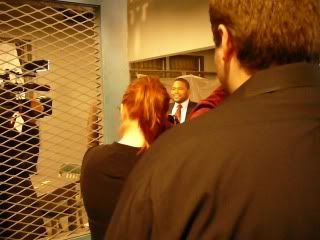Chris Schutz + Tourists, Gemini
There's a lot more to Chris Schutz's sound than the Radiohead-like thrumming bass and plaintive single-note guitar pinches of "White Lady," the opening track on his debut disc. Schutz's voice comes at you as if from a cave beneath your feet and somehow says "postmodern," but the simple fact that you're hearing a good song keeps you listening. Next comes "Spinning Wheel" with its fast pop pulse and organ-heavy wall of sound, clocking in at under 2 minutes 20 seconds, and the folky, vaguely tropical "Continental Drifter" which reads like a cross between the Drifters (title no accident?) and the Mamas and the Papas.
Other songwriting styles and beats drift through the rest of the disc: a swirl of reggae-soul, south of the border trumpets, country-western swagger, a Squeeze-like jauntiness. Slightly muted, echoey production sweeps through everything, reflecting Schutz's use of analog equipment and his 60s-influenced aesthetic. The latter is evident in titles like "Tripping the Bit" and "So High" with its not one but two deceptively simple two-chord hooks alternating with chunky, Kinks-like surprise changes and completely unexpected sax solo.
All tied together by Schutz's honeyed voice and the vintage sounds he and his band prefer, the disc closes with a contemplative acoustic number and a power ballad that sounds like Roy Orbison meeting the Beatles. Like many of the songs, they each bear an unexpected change or two. And that's what this excellent album – definitely one of the top pop debuts of the year – is all about: solid but dreamy pop that does much more than just float by.
Easter Monkeys, Splendor of Sorrow
Easter Monkeys ravaged Cleveland in the early 1980s with drug-addled, slightly psychedelic punk rock. Their album Splendor of Sorrow has been re-released, nicely remastered, and packaged with extras including live tracks and a concert DVD that will definitely please fans. Despite the bleary vocals and anything-goes sensibility, this foursome could play, and this is quite a fun listen if you're in the right mood: loose, goofy, unjaded. It may have helped, in my case, that I never heard of the band before and knew nothing about them except what's in the liner notes, which are themselves thirteen years old.
I have been to several Cleveland rock clubs, though. Even played in a few. I've seen American Splendor. And it does all make a stinky kind of sense. This rocking, jangling, funny music, of a type I don't normally listen to, has grown on me. Like mold in a damp underground club.
Various Artists, Jazz Around the World from Putumayo World Music
Ahhhh… everything's OK. Feels like it anyway.
Must be a Putumayo CD in the stereo.
This time around it's Jazz Around the World, featuring artists from all over (but especially Africa and Europe) performing or at least touching on America's classical music: jazz. Appropriately enough it starts out with Montreal's Chantal Chamberland singing "La Mer" in the original French, her husky alto preparing us for a journey through worlds of cool. Flecks of neo-soul dot the almost disturbingly unthreatening vocal and guitar stylings of Cameroon's Blick Bassy. Djelli Moussa Diawara, who hails from Guinea, applies his kora skills to a Cuban tune as part of the Kora Jazz Trio. Mexico-based group Sherele jazzes up traditional klezmer. Artists better known in the West are represented too: Hugh Masekela teams with singer Malaika and a South African chorus for "Open the Door," which crosses gospel with Afropop. (It's a bit of a stretch to call this particular number "jazz.") And fusion legend Billy Cobham appears with the Cuban group Asere.
Putumayo discs are always likable and almost always relaxing; but some of the choices on this one feel, if anything, excessively safe. Nonetheless it's certainly a pleasant listen and would make a fine stocking stuffer for most world music or jazz fans.
Tom White, Voices from Corn Mountain – Instrumental Music Featuring the Hammered Dulcimer
While Putumayo travels the world in search of music that's both exotic and pleasant to Western ears, your intrepid reviewer has to drive only a few hours north of New York City to work with producer, recording engineer, and multi-instrumentalist Tom White, who kindly gave me a copy of his recent CD. The disc is loaded with instrumental pieces featuring the hammered dulcimer, one of the many instruments of which he is a master. (Tom also plays guitar, fiddle, mandolin, tin whistle, flutes, two different banjos, concertina, and percussion, and that's just on this one CD.) The tunes are a mix of traditional Celtic dances and originals. Email Tom at wizmak at a-oh-ell dot com for information on ordering a copy of this beautiful and unusual recording.
 Jane’s (Julianne Nicholson) husband died a year ago, leaving her with a school-age daughter. Her friend Marrell (Eisa Davis), a brand-new mom herself, has in mind to break Jane out of her widowy slump by introducing her to handsome Jean-Pierre (Louis Cancelmi), a French “Doctor Without Borders.”
Jane’s (Julianne Nicholson) husband died a year ago, leaving her with a school-age daughter. Her friend Marrell (Eisa Davis), a brand-new mom herself, has in mind to break Jane out of her widowy slump by introducing her to handsome Jean-Pierre (Louis Cancelmi), a French “Doctor Without Borders.” Misunderstanding and tragedy carry the day, until the truth comes out years later when it's too late.
Misunderstanding and tragedy carry the day, until the truth comes out years later when it's too late. The hero is a true artist in both senses. He is a wizard with words, a poet, a playwright, even a kind of "artist" with his sword. At the same time, he is supremely "artful" – a kind of trickster, a deceiver, though one with only the noblest of intentions. The pain that motivates him produces many of the play's comical elements as well as its ultimate tragedy.
The hero is a true artist in both senses. He is a wizard with words, a poet, a playwright, even a kind of "artist" with his sword. At the same time, he is supremely "artful" – a kind of trickster, a deceiver, though one with only the noblest of intentions. The pain that motivates him produces many of the play's comical elements as well as its ultimate tragedy.


 Kempe was a middle class wife and mother who ran a brewery and had a vision of Jesus around the time of the birth of her first baby. The story focuses on her inner battle to keep herself spiritually "clean" despite being a married woman. She wanted to be a saint in the way a reality show participant wants to become a celebrity, but she lived under the scrutiny of an intolerant orthodoxy that forbade women from preaching, among other strictures.
Kempe was a middle class wife and mother who ran a brewery and had a vision of Jesus around the time of the birth of her first baby. The story focuses on her inner battle to keep herself spiritually "clean" despite being a married woman. She wanted to be a saint in the way a reality show participant wants to become a celebrity, but she lived under the scrutiny of an intolerant orthodoxy that forbade women from preaching, among other strictures. terrifying Hell (along with Purgatory and Heaven) ever-present in the anxieties of the age, this feels like exactly the Margery we ought to have. One can read a proto-feminist strand into this lusty and freethinking depiction of the character, but any sense of anachronism is made palatable – fun, in fact – by the script's unabashed honesty. The comic dialogue and the flow from scene to scene feel effortless.
terrifying Hell (along with Purgatory and Heaven) ever-present in the anxieties of the age, this feels like exactly the Margery we ought to have. One can read a proto-feminist strand into this lusty and freethinking depiction of the character, but any sense of anachronism is made palatable – fun, in fact – by the script's unabashed honesty. The comic dialogue and the flow from scene to scene feel effortless.
 The ultimate payoff is a real showstopper. Along the way, though, things periodically bog down. For an audience with little knowledge of the arts of the magician- mentalist, the narrative parts of the show may be more edifying than they were to me (I had read a biography of Houdini recently and much of what Mr. Grow talked about was familiar to me from the book).
The ultimate payoff is a real showstopper. Along the way, though, things periodically bog down. For an audience with little knowledge of the arts of the magician- mentalist, the narrative parts of the show may be more edifying than they were to me (I had read a biography of Houdini recently and much of what Mr. Grow talked about was familiar to me from the book). The "million" figure comes from the famous 2008
The "million" figure comes from the famous 2008  One of Ms. Moreno-Penson's goals here is to explore the desperate measures people will take to succeed, and what can happen to them when they overstep the bounds of sensitivity and sense in their quests. Treachery, sex, violence – how far can it go? It all starts plausibly enough. Natalie (the intense, vibrant Kate Benson) meets Brian (the excellent Bryant Mason) in the nameless hotel. Both married (to other people), they're here for some on-the-side action. The playwright has a good ear for the uncomfortable way people talk to each other over heavy subtext, and by the time the pair find their way to bed we think we've got a pretty good idea of their motives.
One of Ms. Moreno-Penson's goals here is to explore the desperate measures people will take to succeed, and what can happen to them when they overstep the bounds of sensitivity and sense in their quests. Treachery, sex, violence – how far can it go? It all starts plausibly enough. Natalie (the intense, vibrant Kate Benson) meets Brian (the excellent Bryant Mason) in the nameless hotel. Both married (to other people), they're here for some on-the-side action. The playwright has a good ear for the uncomfortable way people talk to each other over heavy subtext, and by the time the pair find their way to bed we think we've got a pretty good idea of their motives. Mr. Chapman's monologues rarely fail to grip in some way, but these taken together have a power greater than the sum of their parts.
Mr. Chapman's monologues rarely fail to grip in some way, but these taken together have a power greater than the sum of their parts. Unfortunately the story unfolds ponderously and fails to grip. It feels as though two opposing forces are pulling the piece into a confused state: partially abstract, partially human, it is not fully anything. One waits to be engaged, but is only tickled with a succession of amusing visuals and softly humorous lines, and then it's over. I found my mind wandering a number of times, even though the show was just 45 minutes long.
Unfortunately the story unfolds ponderously and fails to grip. It feels as though two opposing forces are pulling the piece into a confused state: partially abstract, partially human, it is not fully anything. One waits to be engaged, but is only tickled with a succession of amusing visuals and softly humorous lines, and then it's over. I found my mind wandering a number of times, even though the show was just 45 minutes long. And as Ms. Stiles noted last night in a post-performance bloggers' Q&A session, Mamet's script also leaves open the possibility that Carol (backed by a somewhat mysterious group of "those who suffer what I suffer") has set out to target and entrap the professor from the beginning, though the actress has not chosen to specifically play it that way.
And as Ms. Stiles noted last night in a post-performance bloggers' Q&A session, Mamet's script also leaves open the possibility that Carol (backed by a somewhat mysterious group of "those who suffer what I suffer") has set out to target and entrap the professor from the beginning, though the actress has not chosen to specifically play it that way.
